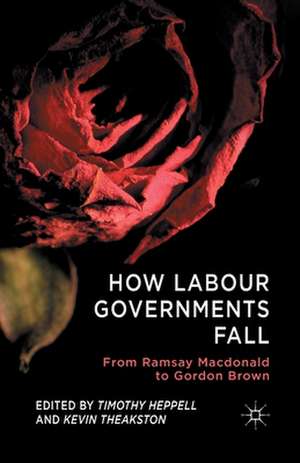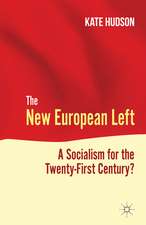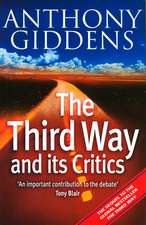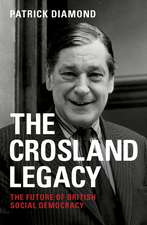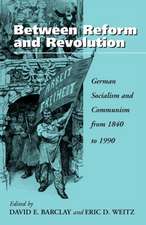How Labour Governments Fall: From Ramsay Macdonald to Gordon Brown
Editat de T. Heppell, K. Theakstonen Limba Engleză Paperback – 2013
| Toate formatele și edițiile | Preț | Express |
|---|---|---|
| Paperback (1) | 372.80 lei 6-8 săpt. | |
| Palgrave Macmillan UK – 2013 | 372.80 lei 6-8 săpt. | |
| Hardback (1) | 380.92 lei 6-8 săpt. | |
| Palgrave Macmillan UK – 9 aug 2013 | 380.92 lei 6-8 săpt. |
Preț: 372.80 lei
Nou
Puncte Express: 559
Preț estimativ în valută:
71.35€ • 74.11$ • 59.26£
71.35€ • 74.11$ • 59.26£
Carte tipărită la comandă
Livrare economică 03-17 februarie 25
Preluare comenzi: 021 569.72.76
Specificații
ISBN-13: 9781349348503
ISBN-10: 1349348503
Pagini: 186
Ilustrații: IX, 186 p.
Dimensiuni: 140 x 216 mm
Greutate: 0.24 kg
Ediția:1st ed. 2013
Editura: Palgrave Macmillan UK
Colecția Palgrave Macmillan
Locul publicării:London, United Kingdom
ISBN-10: 1349348503
Pagini: 186
Ilustrații: IX, 186 p.
Dimensiuni: 140 x 216 mm
Greutate: 0.24 kg
Ediția:1st ed. 2013
Editura: Palgrave Macmillan UK
Colecția Palgrave Macmillan
Locul publicării:London, United Kingdom
Cuprins
Acknowledgements Notes on Contributors List of Figures and Tables 1. Introduction; Timothy Heppell and Kevin Theakston 2. The Fall of the First MacDonald Government 1924; Keith Laybourn 3. The Fall of the Second MacDonald Government 1931; Chris Wrigley 4. The Fall of the Attlee Government 1951; Robert Crowcroft and Kevin Theakston 5. The Fall of the Wilson Government 1970; Peter Dorey 6. The Fall of the Callaghan Government 1979; John Shepherd 7. The Fall of the Brown Government 2010; Timothy Heppell 8 Conclusion; Timothy Heppell and Kevin Theakston Index
Recenzii
'Notwithstanding the recent electoral success of New Labour under Tony Blair, Labour governments falling from office after relatively brief spells in power have been a common feature of the political landscape. Yet relatively little academic attention has been paid to the generic and comparative context, factors, contingencies and consequences of Labour's frequent and not insubstantial election defeats in power. This timely and original collection, which combines the insights of a select and expert band of Labour historians and political scientists, illuminates the common and exceptional, external and internal, recurrent and contingent factors and developments that have contributed to Labour's uneasy grasp on power. In its systematic, multi-dimensional and accessible analysis, it tells us why Labour has failed historically, sociologically, ideologically and presentationally to make the leap to natural party of government.
- Stephen Meredith, Division of History, Politics and Philosophy, University of Central Lancashire, UK
In marked contrast to the performance of many of their European counterparts, until 2001 no Labour government had ever been reelected with a working majority after a full term in office. Nearly ninety years after Ramsay MacDonald first led the party to power in a minority government we still know remarkably little about why so many Labour administrations have been rejected at the ballot box. Bringing together an impressive range of historians and political scientists, this important collection directly addresses the issue through a set of well researched and engaging case studies. In identifying many of the reasons why Labour administrations have run into difficulties, the volume makes a valuable contribution to the subject, one that will provoke further debate and is likely to generate significant lessons for the future.'
-Mark Wickham-Jones, School of Sociology, Politics and International Studies, University of Bristol, UK
- Stephen Meredith, Division of History, Politics and Philosophy, University of Central Lancashire, UK
In marked contrast to the performance of many of their European counterparts, until 2001 no Labour government had ever been reelected with a working majority after a full term in office. Nearly ninety years after Ramsay MacDonald first led the party to power in a minority government we still know remarkably little about why so many Labour administrations have been rejected at the ballot box. Bringing together an impressive range of historians and political scientists, this important collection directly addresses the issue through a set of well researched and engaging case studies. In identifying many of the reasons why Labour administrations have run into difficulties, the volume makes a valuable contribution to the subject, one that will provoke further debate and is likely to generate significant lessons for the future.'
-Mark Wickham-Jones, School of Sociology, Politics and International Studies, University of Bristol, UK
Notă biografică
Dr. Robert Crowcroft, University of Edinburgh, UKProfessor Peter Dorey, University of Cardiff, UKDr Timothy Heppell, University of Leeds, UKProfessor Keith Laybourn, University of Huddersfield, UKProfessor John Shepherd, University of Huddersfield, UKProfessor Kevin Theakston, University of Leeds, UKProfessor Chris Wrigley, University of Nottingham, UK
